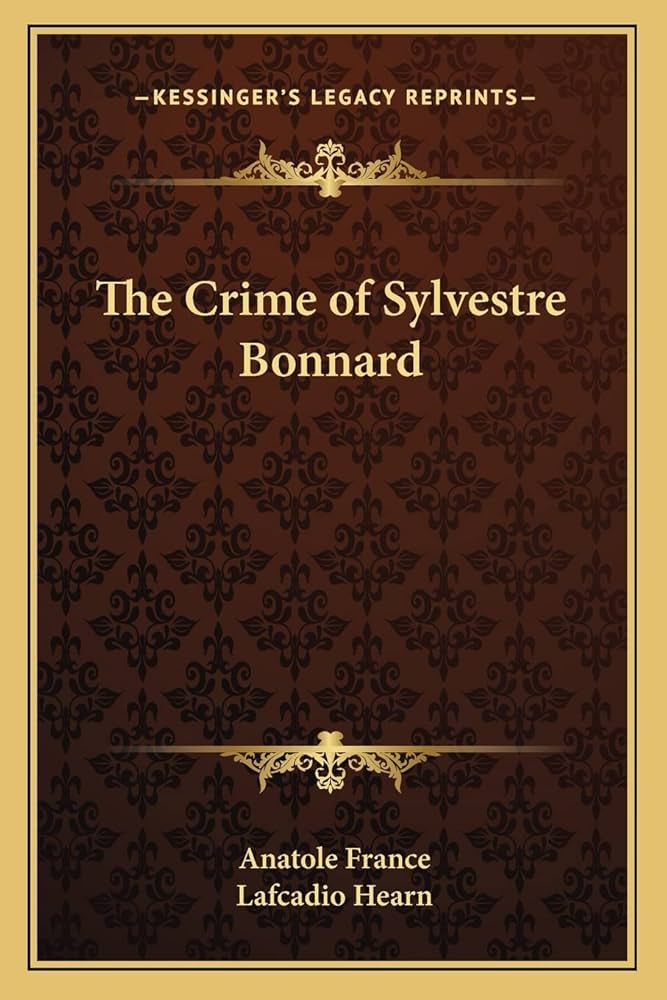Chapter II — The Crime of Sylvestre Bonnard
byChapter II brings a quiet reflection, as the narrator muses on the brevity of life and the urgency to finish his work before time slips away. This sense of passing time isn’t heavy with dread, but touched with realism and a gentle longing to preserve what matters. There is something deeply personal in his awareness—not of death as an end, but as a motivator. Madame de Gabry appears once more, adding her particular blend of grace and mischief to the scene. Her tales about ghostly legends—especially the one of a peculiar lady with three wrinkles on her back—add levity and texture to the morning’s routine. These odd stories don’t just entertain; they give shape to the chateau’s lingering spirit, a place where age clings to every corridor. Her presence brings warmth to the austere routine of breakfast and reveals the comfort found in shared rituals, even when surrounded by fading grandeur.
Bonnard’s scholarly dedication to cataloging the chateau’s manuscripts reflects his commitment to order and historical preservation. The books he handles seem fragile not only in material but in memory. Each page offers him a window into forgotten lives, stories paused by dust and time. But even within this disciplined pursuit, the line between the rational and the whimsical begins to blur. A curious turn of events interrupts his routine: a fairy appears—not from one of the volumes, but seemingly from the room itself. She is elegant, bold, and far from delicate despite her size. She is not there to be studied or interpreted. Instead, she challenges Bonnard’s authority over his surroundings. Tossing nutshells, tapping him with a quill, she is irreverent and playful, yet undeniable. Her very presence calls into question the belief that all knowledge must be bound in paper and verified by scholars.
This unexpected guest becomes a symbol of something larger—imagination intruding upon logic. Bonnard, accustomed to classifying history with precise notes, is now faced with something that defies categorization. The fairy doesn’t seek approval or understanding. She exists purely on her terms, and that irreverence awakens something long buried in the narrator. There’s laughter in the moment, yes, but also realization. Through this strange encounter, Bonnard experiences something he rarely allows himself: surrender to the unexplained. The seriousness of study, once so secure, feels porous now. And in its place, a childlike sense of wonder begins to resurface. Even the fairy’s exit—leaving behind more questions than answers—seems deliberate, as if to say not everything should be resolved.
The memory of the fairy lingers even after she vanishes. Bonnard doesn’t dismiss the experience as fantasy or delusion. Instead, he considers it a privilege. To be visited by something beyond comprehension, to be caught unguarded, is to be truly alive. In that moment, the manuscript he was working on loses its primacy. What matters more is that he felt awe, that his world was briefly rearranged. He doesn’t need to know where she came from. Her existence becomes a private miracle, one not to be studied, but savored. And within this shift, the chapter shows us that there is room for both knowledge and wonder, for scholarship and spontaneity. Bonnard begins to realize that his life need not only be a quiet retreat into dusty archives—it can still surprise him.
The fairy’s visit subtly reorients his perception of purpose. Preserving manuscripts remains noble, but perhaps not enough. There are living moments, too, that need tending. Madame de Gabry’s stories and the fairy’s laughter form a new chapter—not one he expected, but one he accepts. Through them, the old chateau pulses again, no longer just a house of memory, but a setting where even the strange finds a welcome. And in this union of the ordinary and the magical, Bonnard begins to sense that life offers more than conclusions—it offers chapters still unwritten.


